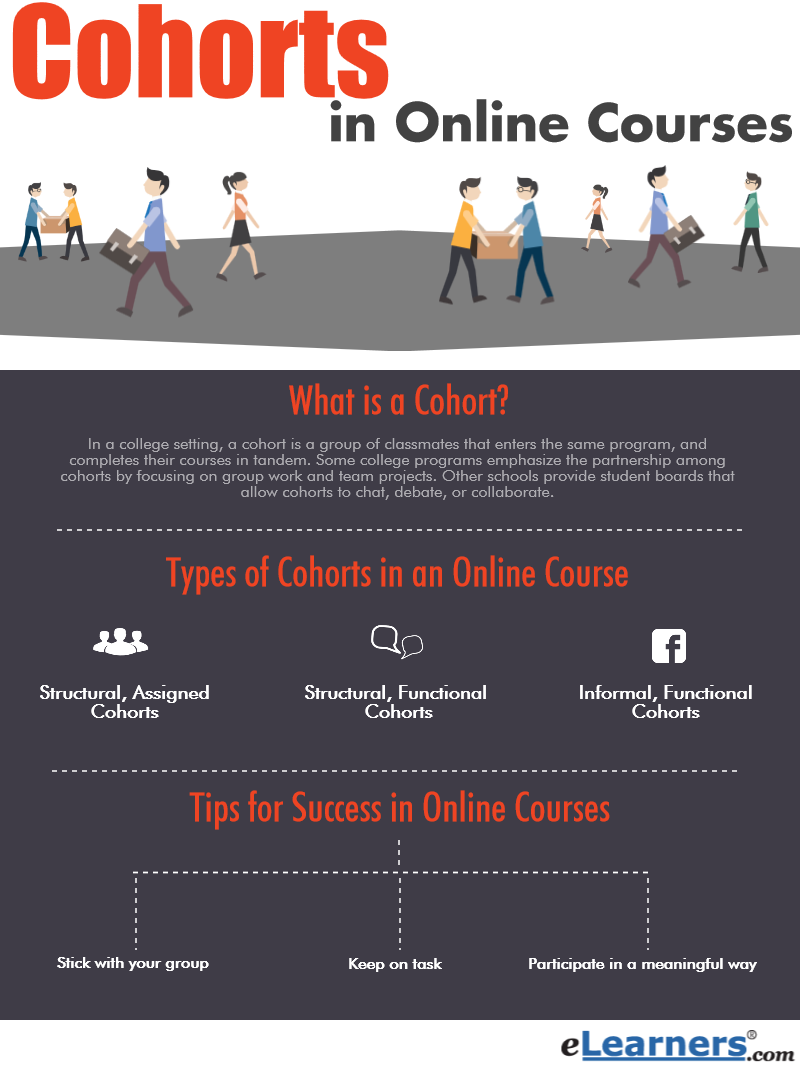 People are communal learners, which explains why classmates and study groups provide such great learning supports. As an online student, you can lean on your cohorts to stay motivated, to feel more involved, and to relieve feelings of frustration.
People are communal learners, which explains why classmates and study groups provide such great learning supports. As an online student, you can lean on your cohorts to stay motivated, to feel more involved, and to relieve feelings of frustration.
So what is a cohort? In a college setting, a cohort is a group of classmates that enters the same program, and completes their courses in tandem. Some college programs emphasize the partnership among cohorts by focusing on group work and team projects. Other schools provide student boards that allow cohorts to chat, debate, or collaborate.
In a traditional, face-to-face degree program, you might find yourself forming an informal cohort. For example, you might organize a study group, or start a club for students in your major. If you worked together on more than one activity, your group would be functioning as a cohort.
Online cohorts are powerful motivators because they compel everyone in the group to keep going, and to avoid dropping out. Students in active cohorts feel less isolated. They also enjoy a sense of continuity – beyond their individual courses. Because even though instructors change from one class to the next, cohorts stay connected.
Statistically speaking, programs that incorporate cohorts have very high graduation rates. The level of academic involvement is high, and job placement is equally high.
Types of Cohorts in an Online Course
What does a cohort look like in the online environment? The groups might vary, depending on your school and the concentration you’re pursuing. But most cohorts share similar interests and career goals. In online college programs, there are several different types of cohorts, all of which can help you.
Structural, assigned cohorts (the group you take all your courses with): Some colleges and universities create cohorts. Your cohort will be the group that shares your courses. Many times, the cohort will consist of individuals from a single corporation or employer (like a military unit, for example.) In this case, you would all be completing the courses together – not just for academic development, but for a clear and tangible career objective.
Structural, functional cohorts (the people you'll take specialized courses/programs with): Chances are, if you're enrolling in a specialty certificate program, you'll end up with fellow students who share interests and career objectives. For example, if you're working on a program that will result in certification in alternative energy, the people you take courses with are a natural cohort. They share an interest in the subject matter, and they are motivated to make connections between the content and the real world. You'll find that your cohort peers are motivated to discuss similar issues, and will be eager to brainstorm and share ideas. Further, you'll find that the practical application of concepts is an ideal to effectively bring about "situated learning." In such cases, you'll likely learn as much from the interaction with your peers as you do from solitary study.
Informal, functional cohorts (your study buddies, your informal help group): As an online student, you can also put together an informal cohort. This type of cohort is like a social networking group you might join on Facebook or MySpace. Because you create it yourself, you don’t have to limit group members to students from your online college. Instead, you can open your group to any individuals who are studying the same subject, or who have the same professional and career interests. An informal cohort – also called a "community of interest” – can be highly effective as you prepare for exams and research papers. You could also establish a Twitter group, wherein members alert each other of professional deadlines, industry developments, and other mission-critical items.
Tips for Success in Online Courses:
Join a group early and stick with it. One of the key factors in the amazing graduation results for cohorts is the fact that individuals join the cohort, and they stay joined. They stick with their group and they do not give up. In fact, the best groups do not let their team members fall by the wayside. Once you're in a cohort, you'll feel the power right away. Some days, you'll feel strong, and you'll be contributing to the group dynamic. At other times, you'll be feeling down and discouraged. That's when your fellow cohort members will reach out to you and lift you up.
Keep on task. You'll be tempted to digress and start chatting / posting about topics that have little to do with your studies. A little bit of personal sharing is great. It humanizes the e-learning space. Too much goofing off, however, is a huge distraction. One of the best things you can do is to make a commitment to yourself and to your group to be as dedicated as possible. Every week, find ways to contribute a focused idea or suggestion.
Participate in a meaningful way. Some team members start to slack off, and to post empty comments – like good idea! Good job! These comments don’t contribute in any substantive way. It takes time and effort to express meaningful, constructive responses. But helpful feedback is vital for the success of your group and the individual members. When you have a chance, be sure to incorporate real-life examples and connections, and to contribute as much as possible to situated, experiential learning.
Let yourself flow, feel the joy! Knowing you're making progress toward your goal is inspiring. It's even better when you're with a group and you're able to share your triumphs along with the travails. When graduation comes around, you'll feel pride of accomplishment – both for yourself and for your new friends and colleagues.
